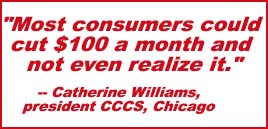|
Get your credit under control
|
 |
March 8, 1999: 9:56 a.m. ET
Don't wait until it's too late to restore your damaged credit, get started now
|
NEW YORK (CNNfn) - If your mortgage payments are getting tough to manage, your debt levels are stacking up and your savings account has sprung a leak, experts say you may be on the fast track to financial disaster.
Samuel J. Gerdano, executive director of the American Bankruptcy Institute, however, said it's not too late to reign in your spending and repair any damage that's been done to your credit.
Just don't ignore the warning signs.
"The early identification of potential problems is the best approach because it gives you the most flexibility and time to deal with it," he said. "A good credit record is the best way to continue to have access to an array of choices available when you need them."
A few other signs you may be heading for a budgetary crisis: repeated late fees on your monthly bills, paying just the monthly minimum on your credit card bills and falling into the habit of transferring balances from one account to another.
"That's when you know it's time to revisit your budget, or make a budget if you don't have one," Gerdano said.
Repairing your credit
There are lots of reasons why you might find yourself suddenly strapped for cash.
Sometimes it's medically related, or maybe layoffs left you unemployed. Both could happen to anyone through no fault of their own.
But if your troubles stem from mismanaged funds, that's a problem that needs correcting.
Catherine Williams, president of Consumer Credit Counseling Service of Greater Chicago, said you should start by taking stock of your monthly income and expenditures.
Be prepared, though: Digging yourself out of debt won't be easy.

"The very first thing is to sit down and put a serious budget together," she said. "That will tell you what options you've got. It's going to mean making some real hard spending choices."
Even so, Williams said most consumers can trim some of the fat from their budget without ever noticing.
"Most consumers could cut $100 a month and not even realize it," she said. "That coffee at Starbucks everyday and the newspaper add up. You may have three-way calling. And how many magazines come in that you throw out because the rack is full?"
Also, don't wait until the creditors come knocking on your door to let them know what's going on. As soon as it becomes clear you won't be able to meet your financial obligations on time, call up the credit card company.
The NFCC said creditors are more flexible than you think and will often work with you to establish a repayment schedule, sometimes without harming your credit.
If your case is more serious, you can seek the help of a credit counseling agency, which will intervene on your behalf through a debt management program (for around $11 a month).
Consumer credit counselors negotiate with your creditors and help minimize your monthly payments and interest charges. They will also put a stop to the repeated phone calls from creditors.
The CCCS, a non-profit group affiliated with the NFCC, has negotiated lower interest rates and other concessions with most of the major creditors in the country. In return, the creditors pay CCCS a percentage of the money that they get you, the debtor, to pay back.
Williams said striking a lower-interest deal with your creditors could leave a few marks on your record, but paying back what you owe must remain the priority.
"The important thing is you are paying off the debt," she said. "When it comes to credit, your record will heel."
Step by step
Once you get the numbers crunched, make a pact with yourself to buy only durable goods, or big-ticket items, with your credit cards, she said. Paying for groceries, gas and tennis shoes with plastic can add up fast.
And most importantly, she said, stop relying on your credit card as a way to "get by."

Since credit often entices consumers to spend more than they should, Williams said you should tear up all your cards but one - and use that only for emergencies. Consider it off-limits for day-to-day use.
The American Bankruptcy Institute also suggests you begin monitoring your credit history once a year by obtaining copies of your credit report
You can use any of the three largest credit reporting agencies -- Experian, Trans Union, and Equifax.
It'll cost you about $8 per copy, unless you live in one of the following six states, which entitles you to one free copy a year: Colorado, Massachusetts, Maryland, New Jersey, Vermont and Georgia. (Georgia actually allows you two free copies a year.)
Let the healing begin
Now the healing process can begin.
If you don't already have one, the National Foundation for Consumer Credit says you should establish up a checking account at a bank or financial institution that offers credit cards. Start a savings account, too.
But be sure to pay all of your bills on time, from here on out.
Credit unions also can go a long way toward building and repairing your credit. They offer savings accounts and many offer interest bearing checking accounts.
The costs of bankruptcy
It may seem like an easy way out, but bankruptcies leave more than just a short-term blemish on your record. They can do major damage to your credit rating and prevent you from qualifying for future loans.
Last year alone, personal bankruptcy filings soared to 1.4 million, up 95 percent from 1990 when they totaled 718,107.
The bankruptcy itself stays on your record for 10 years, but Gerdano, of the ABI, said banks often ask if you've "ever filed for bankruptcy" on their mortgage loan applications.
You can be certain that a "yes" answer won't do you any good.
Even if you do secure the loan, it'll cost you more - often significantly more - in interest rate fees than your more financially stable counterpart.
While it's best to avoid filing for bankruptcy, a growing number of consumers are finding they have no other way out due to soaring debt levels.
Personal bankruptcy filings soared 95 percent in the last eight years alone, the ABI reports.
"This third consecutive record year of bankruptcies correlates closely with the increased debt load carried by American families," Gerdano said.
"The same consumer spending that helps to sustain the national economy can put households at risk of needing bankruptcy relief," he added. 
--by staff writer Shelly K. Schwartz
|
|
|
|
|
 |

|

